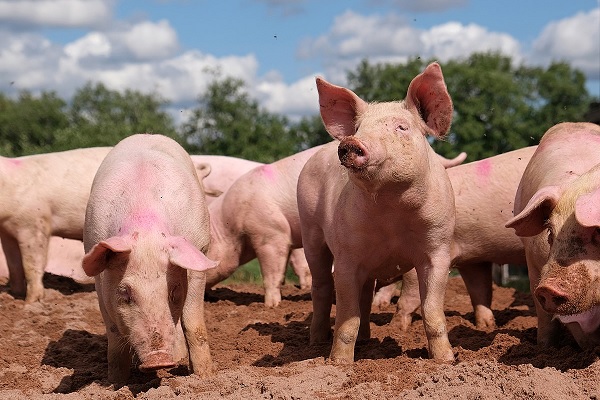
–>
May 31, 2023
On 11 May, the U.S. Supreme Court decided National Pork Producers’ Council v. Ross, in which the justices ruled by a 5-4 margin that California’s Proposition 12, approved by voters in 2018, is constitutional. Proposition 12 banned the sale, in California, of pork derived from pigs, or the offspring of pigs, that were confined on less than 24 square feet of floor space per breeding pig, or “in a manner that prevents the animal from lying down, standing up, fully extending [its] limbs, or turning around freely.”
‘); googletag.cmd.push(function () { googletag.display(‘div-gpt-ad-1609268089992-0’); }); document.write(”); googletag.cmd.push(function() { googletag.pubads().addEventListener(‘slotRenderEnded’, function(event) { if (event.slot.getSlotElementId() == “div-hre-Americanthinker—New-3028”) { googletag.display(“div-hre-Americanthinker—New-3028”); } }); }); }
The case was an important decision for states’ rights, and it split the Court in an unusual way: Justices Thomas, Gorsuch, Sotomayor, Kagan, and Barrett sided with California, while Justices Roberts, Alito, Kavanaugh, and Jackson voted against allowing the new law to go into force.
It is worth noting that of the five justices who made America’s liberals so angry by deciding Dobbs v. Jackson last summer, three of them — Thomas, Gorsuch, and Barrett — sided with deep-blue California in this particular dispute, while the four left-leaning justices were split half and half. (Bizarrely, the Biden administration deferred to commercial interests by asking the Court not to rule in favor of California — thus angering many Democrats who support animal rights.)
All of this says something important about the fairmindedness and integrity of the Court’s new conservative majority. Last summer, you probably heard over and over again from the left-wing press that the Court was making itself too powerful, or tearing down American democracy, or other such black-is-white drivel. This case proves (in case more proof was still needed) that this isn’t true: most of the Court’s conservatives are willing to let laws stand — even laws that are unpopular on their own side of the aisle — when there isn’t a clear reason, based on the text of the Constitution, to strike them down.
‘); googletag.cmd.push(function () { googletag.display(‘div-gpt-ad-1609270365559-0’); }); document.write(”); googletag.cmd.push(function() { googletag.pubads().addEventListener(‘slotRenderEnded’, function(event) { if (event.slot.getSlotElementId() == “div-hre-Americanthinker—New-3035”) { googletag.display(“div-hre-Americanthinker—New-3035”); } }); }); }
In other words, if the National Pork Producers’ Council disagrees with the reasoning behind California voters’ decision to ban pork from pigs confined on less than 24 square feet of floor space, it should deal with the issue by lobbying California to change its laws, or by lobbying Congress to override them — not by asking the federal courts to create a new constitutional right. While pig farmers who sell their meat to California will indeed be burdened by the law, that alone isn’t reason enough to strike it down. As the conservative Justice Barrett put it in her concurrence:
California’s interest in eliminating allegedly inhumane products from its markets cannot be weighed on a scale opposite dollars and cents — at least not without second-guessing the moral judgments of California voters or making the kind of policy decisions reserved for politicians.
Basically, under the new regime that began last summer, citizens in red states are allowed to enact laws that reflect their conservative sense of morality, and citizens in blue states are allowed to enact laws that reflect their liberal sense of morality. There are still exceptions for genuine constitutional rights like freedom of speech, freedom of religion, freedom from racial discrimination (such as that practiced by Harvard), and the right to keep and bear arms. But otherwise, voters and elected legislatures will be given the benefit of the doubt.
What that means is that we are getting actual neutrality now — not just a mirror image of the last fifty years of American jurisprudence, where a law was constitutional if and only if it aligned with the moral standards of a particular wing of a particular party.
Now, it’s worth describing in some detail what legal doctrine the Pork Producers’ Council used to challenge California’s law, and why so many justices from across the ideological spectrum rejected it.
The case was brought under the Dormant Commerce Clause. This is a constitutional doctrine (not an actual clause of the Constitution) that states that, because Congress is given power, in Article I, “[t]o regulate Commerce with foreign Nations, and among the several States, and with the Indian Tribes,” the states can’t regulate interstate commerce. (Another related clause prohibits states from laying “Imposts or Duties on Imports or Exports” without the consent of Congress.)
‘); googletag.cmd.push(function () { googletag.display(‘div-gpt-ad-1609268078422-0’); }); document.write(”); googletag.cmd.push(function() { googletag.pubads().addEventListener(‘slotRenderEnded’, function(event) { if (event.slot.getSlotElementId() == “div-hre-Americanthinker—New-3027”) { googletag.display(“div-hre-Americanthinker—New-3027”); } }); }); } if (publir_show_ads) { document.write(“
Since practically every law that a state makes will affect interstate commerce in some way or another, this doctrine has led to the creation of a murky area of constitutional law that deals with the question of how much of an “extraterritorial effect” a state law can have without violating the Constitution. This branch of law is necessary, since the Union couldn’t function if states had too much authority to regulate affairs outside their own boundaries. (Also, one of the main reasons that the Founders rewrote the Constitution back in 1787 was to prevent states from erecting trade barriers, and to ensure that all businessmen in the country had access to a common market for their goods.)
This, for instance, is how the Supreme Court unanimously decided, in a series of cases early in the twentieth century, that states cannot use price-fixing to protect in-state goods from out-of-state competition. Also, in 1970, a unanimous Court ruled in Pike v. Bruce Church, Inc. that Arizona could not require that cantaloupes grown in the state also be packaged there, since this privileged Arizonian labor over that of other states, where the cantaloupes might be packaged more efficiently.
Pike was the main precedent that the justices in Pork Producers Council cited, over and over again, in both the majority opinion and the dissent, in order to explain why the California law should (or should not) be allowed to go into effect. Basically, they were trying to decide whether it put an unacceptable burden on out-of-state pork producers, who will now have to adjust their production methods in order to keep selling in California (which, being the most populous state, isn’t a market they can afford to lose).
But as the majority saw it, the problem with applying the Pike precedent was that California wasn’t doing anything to privilege in-state interests over out-of-state interests. (After all, Californian pig farmers have to follow all the same rules, and ordinary Californians were fully aware that the price of their own ham and bacon would go up somewhat as a result of the votes they cast in favor of Proposition 12.)
For the most part, California’s voters decided to enact Proposition 12 because they thought that putting sows in stalls so narrow that they can’t turn around is cruel. And as Justice Gorsuch (who wrote the majority opinion) explained, it isn’t a court’s job to balance this belief against the monetary interests of the pork producers.
“How is a court,” he wrote, “supposed to compare or weigh economic costs (to some) against noneconomic benefits (to others)? No neutral legal rule guides the way. The competing goods before us are insusceptible to resolution by reference to any juridical principle. Really, the task is like being asked to decide ‘whether a particular line is longer than a particular rock is heavy.'”
At the end of the day, Justice Gorsuch’s ruling comes as a loss to people who think the Court’s job is to advance any particular ideology, be it conservative or liberal, pro-business or anti-farmer or what-have-you. But it’s a win for people who want to live under an impartial Judiciary, under a Constitution that means what it says, and under a law code written by elected legislatures rather than special interest groups and their lawyers.
It also shows that today’s Supreme Court is led by justices who take their duties seriously, and who are capable of self-restraint, magnanimity in victory, and treating their opponents with a level of fairness that the liberals never displayed during their years in power.
Twilight Patriot is the pen name for a young American who lives in Georgia, where he is currently working toward a graduate degree. You can read more of his writings at his Substack.

Image: kallerna via Wikimedia Commons, CC BY-SA 4.0 (cropped).
<!–
–>
<!– if(page_width_onload <= 479) { document.write("
“); googletag.cmd.push(function() { googletag.display(‘div-gpt-ad-1345489840937-4’); }); } –> If you experience technical problems, please write to [email protected]
FOLLOW US ON
<!–
–>
<!– _qoptions={ qacct:”p-9bKF-NgTuSFM6″ }; ![]() –> <!—-> <!– var addthis_share = { email_template: “new_template” } –>
–> <!—-> <!– var addthis_share = { email_template: “new_template” } –>





